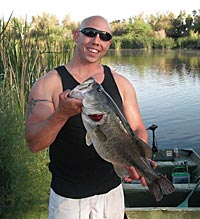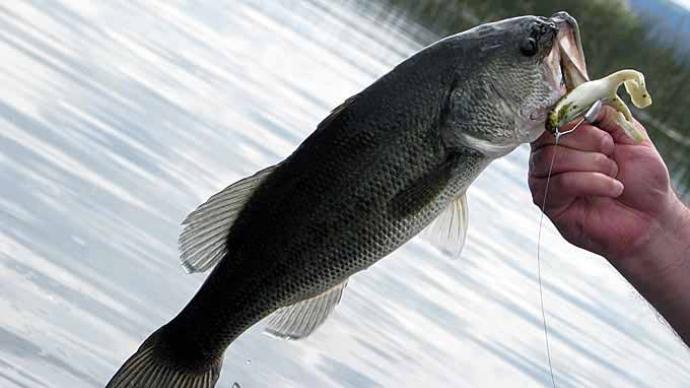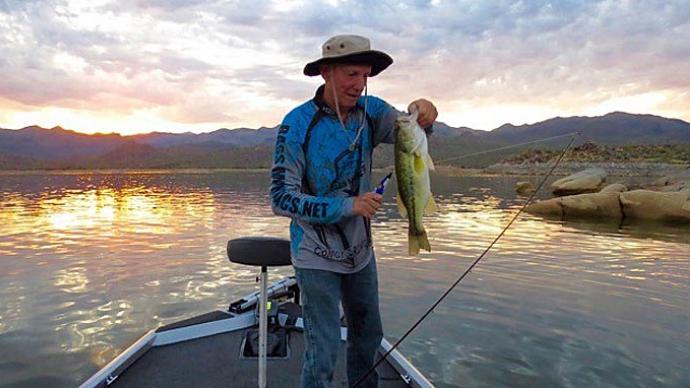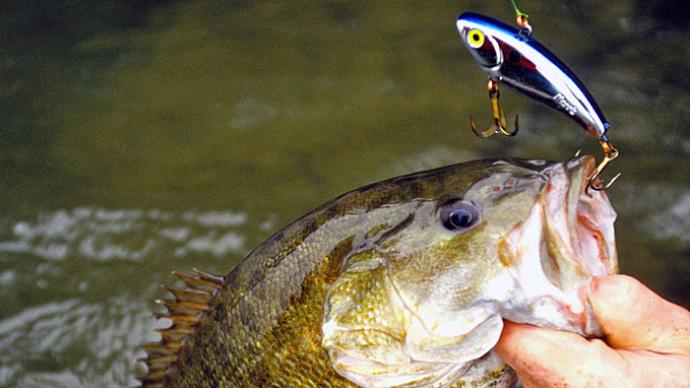
Do you remember the pond or small lake where you fished the first time? Many of us do. We fished small water as children and those memories can be as wonderful as the ones we've created on any lake we might fish today. Tanks, small lakes or ponds were the places that we explored in our youth, the places where we learned about nature - the real birds and bees from a kid's perspective. If we didn't catch any fish, we'd fish for crawfish or just play by the side of, or in, the water. There were lots of things to see and do there.
As we got older, we started using lures and fishing a little more seriously. Lures were really fun because we got to run up and down the banks and throw a lot. Lures were special because that's what the "big boys" used to catch fish. We caught lots of fish back then, or at least we seemed to. And somehow the fish all seemed bigger, even though in reality as we grew older we knew they weren't. We were proud of all our catches all the same.
But fishing that small water offered us the opportunity to stand in one place and make literally dozens of casts. We had to fish the water that was available. It wasn't like we could run down the lake, or move up the bank. Where we were fishing was all there was to be had.
This element caused us to do something we often fail to do now, fish one area more thoroughly. We made more casts to the same spot. This close-in fishing made us more observant of the factors involved in when, and where, we caught fish. We probably got a better education on small water than on a lake where we could run up and down the lake all day.
You'd be surprised at how many fish you can catch standing in one place just by changing lures or even just the action of the same bait. You can learn more about different techniques, patience, and really fishing water more thoroughly. Five or six casts aren't thorough enough sometimes and we often forget this.
At small lakes, beyond the little tanks and ponds, in an afternoon of fishing you might not cover but a few acres of water. But by fishing the areas available with more patience, success is often the result. Most fishermen don't realize how many fish they pass right over in a day of fishing. Of course not all of the fish are feeding, so they can't all be caught. But by fishing one area thoroughly, you will catch fish by intercepting them as they move and feed. By fishing one area for a longer period of time, you will learn more about the bottom structure and locating the specific places where bass stop and where they hunt for food.
The things seasoned anglers overlook most often are very small stumps, rocks, and most especially single bushes or sticks - imperceptible cover. Excellent cover for bass in small water can be just a small single twig standing alone with nothing else near it. The only way to find these types of cover is to fish thoroughly and keep your eyes open. Many lakes have an abundance of heavy cover and structure, but the fish don't always hide in just the heaviest timber or grass. What they perceive as protection is often different from where you might think they should be.
A lake under 2,000 acres is small water. But these can be great learning grounds especially for someone just getting started in bass fishing. Even if you've been fishing for years and the lake you prefer is as big as say Sam Rayburn, you can section the lake down to small-water size and learn more about selected areas. Choose one cove or even two and limit yourself to fishing only those areas. It's amazing what you can see when you slow down to a small water sized pace. The next time you go to the lake, fish another area, and so on until you'll find that you know a lot more about a lot more of the lake.
Small water offers many things that larger lakes do not. Most of the time they are safer as you are normally pretty close to a ramp in case of rapid weather changes. Small bodies of water are usually fairly well protected from the treacherous winds that large lakes can be assaulted by. Most smaller lakes have less fishing pressure than larger ones.
Many of the small lakes offer great fishing. You can very often catch large bass, perhaps even the bass of a lifetime, on small bodies of water. Many record books still carry some pretty big bass caught on very small water.
The key to fishing any body of water is to choose an area and stay with it. Don't just run and gun all over the lake. There are a number of things to look for when choosing an area. First, you need a map to locate a good, winding creek. If you can locate two together that's even better, especially if they're close to each other. You want them to be well-defined channels without a lot of silt. Lots of bends are always good. Large flats with small pockets off to the sides are good areas for spawning fish at certain times of the year. Even small docks or other structures can be great when near any deep-water sanctuaries.
As you move out onto the main lake, docks, points, tank dams, and roadbeds are terrific fish-holding areas. You won't always find all these structures and covers, but the more options you can find the better.
The three most important things to look for are good creek channels, water depth of 20 to 30 feet out at the mouths, and several good points. And any time you can find grass, spend a lot of time fishing it. Another thing to consider is that larger populations of bass normally live on the lower ends of the lake. Not always, but the majority of smart anglers will usually start on the lower ends of lakes, even large ones. You can catch a number of fish on the upper ends of lakes. But if you're on new water, remember that the lower end of a lake will usually have better access and better fishing so start there.
If you don't know a lake very well, try fishing the creek arms on the lower end. One other place to start fishing is in protected pockets along the main lake. They don't have to be creeks, they can be draws that run in 100 to 200 yards. The best ones will run east and west. This type of pocket will be slightly protected from north and south winds. Bass living in these areas will remain in a plot of 300 or 400 acres throughout the year. Choose one section this size and fish it all day. There are fish there, plenty of them to catch.
Conditions need to be favorable for this to occur. But you would be surprised how many of our lakes have these conditions. And if you caught good bass there in the spring, the odds are good that they will also hold fish in the summer as well.
Most of the time, points at the mouths of pockets will hold fish year round. Again, try to find water 20 feet or deeper off the ends of these points. When choosing a creek arm or main-lake pocket, try to fish small sections of the area to begin with. Stick to your small-water pattern and fish the area thoroughly.
Once you have selected a starting spot either on a map or a previous trip, take seasonal patterns into consideration. Spend your time fishing instead of running all over the lake. If it's winter, start in the mouth of a creek arm. Fish the deeper side and look for any areas that a creek might come close along this bank.
Jigs, crankbaits, and spinnerbaits will catch bass year round and are always good choices. A spinnerbait is good for shallow cover out to about five feet, a crankbait will work from three feet to as far as 15 or 25 feet, and you can flip jigs around laydowns and heavy brush. This can make for a superb day of fishing. You can even fish the spinnerbait down as deep as 10 feet or more in winter or summer. Be sure to try different retrieves with each lure you throw. Start slow, then try fast and make sure to break it up with stop-and-go type retrieves until you find what action the fish want.
In winter, slow down. Most of us fish too fast, most of the time. Force yourself to throw to a spot at least eight times. You'd be amazed that it may take that many times to entice the fish to hit the bait. Again, five or six casts to one spot many times just isn't enough!
The things we learned as children fishing small water can help us every day even on big water. Multiple casts to the same spot is just one thing that works well anywhere. There are no set rules to fishing. If you ever stop experimenting, you stop learning.
Water temperature plays a big role in fishing. Small lakes are, for the most part, better protected than larger ones. This, along with the fact that small bodies of water warm quicker than larger ones, make small lakes great winter fishing holes and even better teaming grounds.
As you start fishing, always check your temperature gauge. If it's been warm for a couple of days and the water temperature in the lower 50's, throw a spinnerbait or perhaps a crankbait. If it's cool and the water is 48 or 49 degrees, try a jig. The best temperature gauge will be the fish. The water temperature will dictate the speed of retrieval, and type of bait used. Warm water - faster, cold water - slower.
At the start of the day, fish slower and deeper or shallow with a slower bait. During the afternoon try switching to a little faster and shallower. If you find temperatures running 55 degrees, expect to find bass in six feet or less of water. As water temperature rises, and sometimes even water levels, more bass are likely to be shallow more often during the day. Once the temperature is in the high 60's to low 70's, bass start moving back out of the upper creeks and pockets and into the cooler depths. This seasonal patterning holds true pretty much on all lakes, with a few exceptions of lakes where the water stays cooler longer, etc.
Try to fish more toward the main-lake areas as summer gets underway. Many bass will hold on the mouths of creeks and pockets near areas closer to deeper water and cover or structure. As fall comes, bass can be expected to move back into creek arms and feed heavily. Most of the time you can find them as far back in fall as you can in spring. Try fishing about half way back in the mouths of creeks and pockets. Very often the summer heat drops the lake level and those fish that were shallower for the most part will move deeper.
Small water is great for fishing whether you are a grownup or a child, beginner, or seasoned angler. The little places can be fantastic for trying out new lures, honing techniques, or even learning new ones. Just remember, no matter how big the water you're fishing might be, pretend it's small and you'll be amazed at how much more you'll know about it by the end of the day.




